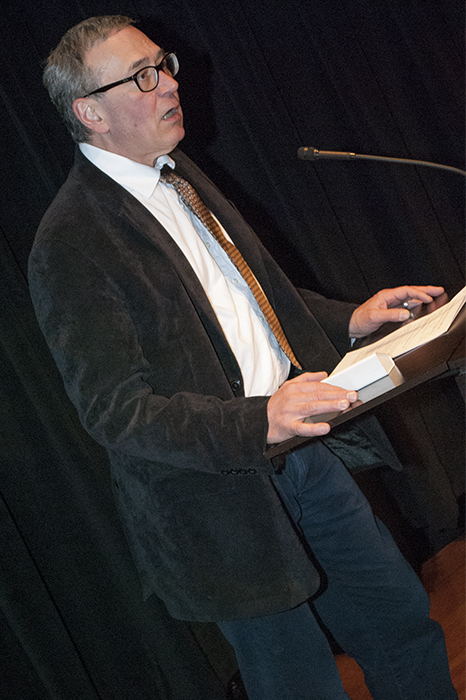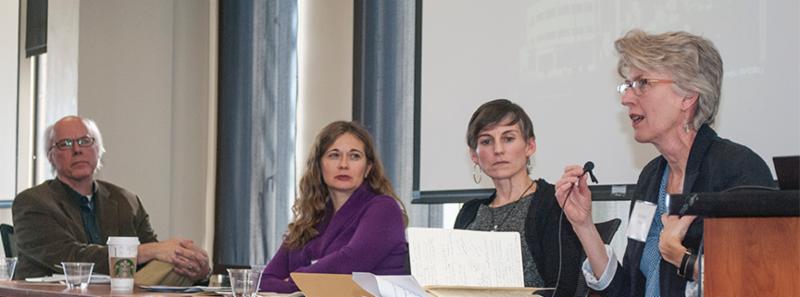Event Review: International Symposium “Reframing Mass Violence: Social Memories and Human Rights in Post-Communist Europe”
(IAS Collaborative)
March 4-6, 2015
An international symposium on “Contested Past, Contested Present: Social Memories and Human Rights in Post-Communist Europe” took place at the University of Minnesota, Twin Cities on March 4-6. It was organized by the IAS Collaborative “Reframing Mass Violence”, and sponsored by the Human Rights Program and the Center for Holocaust and Genocide Studies, among other supporters.
 The symposium opened with akeynote lecture by Prof. John-Paul Himka , who spoke about the reception of the Holocaust in post-Communist Europe, especially its legacies in Poland and Ukraine. OnThursday and Friday, sessions covered different aspects of contested memories in post-Communist European countries, from depictions in theater, museums, and film, to transitional justice policies, and the current conflict in the Ukraine. The presentations and ensuing discussions illustrated that the past of post-Communist states remains, indeed, a contested space, negotiating narratives of rising nationalism, victimhood, responsibility, retribution and rehabilitation.
The symposium opened with akeynote lecture by Prof. John-Paul Himka , who spoke about the reception of the Holocaust in post-Communist Europe, especially its legacies in Poland and Ukraine. OnThursday and Friday, sessions covered different aspects of contested memories in post-Communist European countries, from depictions in theater, museums, and film, to transitional justice policies, and the current conflict in the Ukraine. The presentations and ensuing discussions illustrated that the past of post-Communist states remains, indeed, a contested space, negotiating narratives of rising nationalism, victimhood, responsibility, retribution and rehabilitation.
Several themes emerged as central to the discussion of post-Communist memory. First, one theme highlighted the tension, but also interaction between a multiplicity of vernacular memories and often more hegemonic, official ones. Dr. Lars Breuer addressed this in the German and Polish context, as categories of perpetrator and victim appear fluid, and memories multidirectional. Prof. Matti Jutila also focused on challenging interpretations of the past by examining the film “The Soviet Story”. He argued that the film illustrates the “Double Genocide” thesis, which seeks to posit Soviet atrocities on par, if not as exceeding those committed during the Holocaust, and asked how might it be possible to criticize the political use of mass atrocities without denying or downplaying their significance.
The second key theme was the potentiality of creative spaces to deal with past atrocities, but also their limitations. Prof. Sarah Wagner addressed this in her talk about Srebrenica, noting that parallel sites of commemoration exist in the space, symbolizing the divided publics not in conversation with one another. The potentiality of creative spaces as redemptive was also highlighted during the last session of the symposium, where Prof. Michal Kobialka presented on a 1944 staging of “The Return of Odysseus” by Tadeusz Kantor in a bomb-damaged room in Krakow as a radical event, bringing into question the distinction between being and appearance, use value and uselessness, and the role of art as autonomous. Referencing a more contemporary context, Margarita Kompelmakher spoke about the Belarus Free Theater’s performance as one of a human rights paradigm, aiming to be universal, but also limited by the very explicit body it uses to make its point.
The third theme was that of transition, justice and rehabilitation. Prof. Jelena Subotic spoke about the ways a mythologized Communist past shapes how former Yugoslav states imagine their future, at times building on problematic and nationalist pre-WWII narratives and mechanistic assessments of success by ICTY standards. Thomas Wolfe questioned the  nature of the field of transitional justice. Its assumptions, its philosophical sources and allegiances, its methodological orientations, and most of all, its understanding of how the past exists in, living through the present. Dr. Ryan Molz addressed the lustration policies in Macedonia, Croatia and Serbia, arguing that each of the states had a differing level of implementation of this vetting process due to internal factors, while external factors, such as the international community, have largely been unsupportive of lustration policies. Later, Prof. Adam Czarnota addressed the tension between a demand for formal “rule of law” in countries in transition and the realities of lived memory and informal rule of law already existing in the states. Czarnota noted that there is often a “supply of law”, but no matching demand in transitional contexts. Finally, Prof. Nadya Nedelsky spoke about Slovakia’s struggle with its past, pointing out that societal and academic discourse often do not intertwine on the ground, leading to deeply problematic issues, such as the downplaying of the Nazi-aligned state of the 1930s.
nature of the field of transitional justice. Its assumptions, its philosophical sources and allegiances, its methodological orientations, and most of all, its understanding of how the past exists in, living through the present. Dr. Ryan Molz addressed the lustration policies in Macedonia, Croatia and Serbia, arguing that each of the states had a differing level of implementation of this vetting process due to internal factors, while external factors, such as the international community, have largely been unsupportive of lustration policies. Later, Prof. Adam Czarnota addressed the tension between a demand for formal “rule of law” in countries in transition and the realities of lived memory and informal rule of law already existing in the states. Czarnota noted that there is often a “supply of law”, but no matching demand in transitional contexts. Finally, Prof. Nadya Nedelsky spoke about Slovakia’s struggle with its past, pointing out that societal and academic discourse often do not intertwine on the ground, leading to deeply problematic issues, such as the downplaying of the Nazi-aligned state of the 1930s.
The symposium also held a session on the Ukraine conflict, where professors John-Paul Himka, George O. Liber and J. Brian Atwood addressed the different aspects of the current events. Himka spoke about the role of the regional specifics of Ukraine, and historical differences between them, while Liber addressed Vladimir Putin’s response to the Ukrainian Revolution of 2013-2015 and Russia’s current aggressive foreign policy in the region. Atwood provided an informative view on the current crisis from a U.S. perspective, based on many years of experience in various state institutions, including USAID.
Overall, the event foregrounded issues of how long a transition lasts, what are ways contested pasts are conceptualized and dealt with, legally, commemoratively, and artistically, and how memories can be and are at times used for political purposes. The symposium also highlighted a need to balance contested memories, interpretations of the past with long-term policies that are not merely cosmetic and mechanistic, but often demand a true reevaluation of a country’s history. However, this demands interest and a willingness to do so by the communities in the states themselves. Arguably, the race for EU accession and externally shaped Transitional Justice policies may have resulted in speedy formal establishment of institutions to this effect, but equally seems to have in some instances created a space for hegemonic and reductionist narratives to take hold.
(Full video recordings of all sessions available here, here, and here.)
Arta Ankrava holds an MA in Social Anthropology from Goldsmiths, University of London and is currently a PhD candidate in Sociology at the University of Minnesota. She is interested in diasporic identity, transnationalism, and collective memory. Arta is working on a dissertation about anti-Communism in the Latvian American exile community during the Cold War and through the collapse of the USSR. It is based on her research in the Latvian American Periodicals Collection at the Immigration History Research Center, University of Minnesota.

Comments